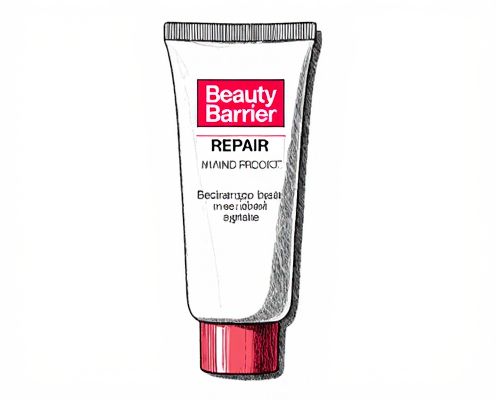
Barrier repair Illustration
Effective barrier repair restores the skin's natural protective layer, preventing moisture loss and shielding against environmental irritants. Ingredients like ceramides, fatty acids, and cholesterol work synergistically to rebuild and strengthen the skin barrier. Consistent use of barrier repair products promotes hydration, reduces sensitivity, and enhances overall skin resilience.
Understanding Skin Barrier Function in Beauty
The skin barrier plays a critical role in maintaining hydration, protecting against environmental aggressors, and preventing transepidermal water loss. Effective barrier repair involves restoring lipids such as ceramides, cholesterol, and fatty acids to enhance skin resilience and smoothness. Targeted skincare products with ingredients like niacinamide and panthenol promote barrier reinforcement, supporting healthier, radiant skin.
Common Causes of Skin Barrier Damage
Common causes of skin barrier damage include excessive cleansing, over-exfoliation, and prolonged exposure to harsh environmental factors such as UV rays and pollution. Frequent use of products containing alcohol, fragrances, and sulfates weakens the skin's natural protective layer. Additionally, underlying conditions like eczema and dry skin contribute to compromising the skin barrier's integrity.
Essential Ingredients for Effective Barrier Repair
Ceramides, niacinamide, and fatty acids are essential ingredients for effective skin barrier repair, promoting hydration and restoring the lipid matrix. Hyaluronic acid aids in moisture retention, while cholesterol works synergistically with ceramides to enhance barrier function. Incorporating these ingredients in skincare formulations supports skin resilience and reduces sensitivity.
Ceramides: The Building Blocks of Skin Health
Ceramides are essential lipids that form the skin's protective barrier, preventing moisture loss and shielding against environmental irritants. Their role in barrier repair is crucial for maintaining hydration and reducing sensitivity, especially in dry or damaged skin. Skincare products enriched with ceramides help restore this natural barrier, promoting healthier, more resilient skin.
The Role of Fatty Acids and Cholesterol in Repair
Fatty acids and cholesterol are essential components in the skin's barrier repair process, providing structural integrity and maintaining hydration by reinforcing the lipid matrix within the stratum corneum. Ceramides, cholesterol, and free fatty acids work synergistically to restore damaged skin barriers, reducing transepidermal water loss and enhancing resilience against environmental stressors. Topical formulations enriched with these lipids support natural barrier regeneration, promoting healthier, more balanced skin.
Hydration Heroes: Hyaluronic Acid and Glycerin
Hyaluronic acid and glycerin are essential hydration heroes in barrier repair, enhancing skin's moisture retention and elasticity. These humectants attract and bind water to the skin's surface, promoting long-lasting hydration while strengthening the skin barrier against environmental stressors. Regular use of products containing hyaluronic acid and glycerin supports improved skin texture, reduces dryness, and accelerates recovery from irritation.
Peptides and Their Benefits for Barrier Recovery
Peptides play a crucial role in skin barrier repair by stimulating collagen production and enhancing cellular communication, which accelerates the healing process. These bioactive molecules strengthen the skin's protective layer, reducing inflammation and preventing moisture loss for improved hydration. Regular use of peptide-enriched formulations promotes faster recovery from environmental damage and supports overall skin resilience.
Integrating Barrier Repair into Your Skincare Routine
Incorporating barrier repair into your skincare routine enhances skin hydration and resilience by restoring the lipid layer with ingredients like ceramides, niacinamide, and fatty acids. Consistent use of gentle cleansers and moisturizers formulated for barrier support prevents moisture loss and protects against environmental irritants. Prioritizing barrier repair minimizes sensitivity and promotes a healthy, glowing complexion over time.
Signs of a Strengthened Skin Barrier
A strengthened skin barrier appears smoother, with reduced redness and fewer breakouts, indicating improved protection against environmental irritants. Enhanced hydration levels result in plumper, more resilient skin that retains moisture effectively. Increased firmness and a balanced texture signal restored lipid layers and optimal barrier function.
Expert Tips for Maintaining Long-Term Barrier Health
Maintaining long-term skin barrier health involves using gentle, pH-balanced cleansers and incorporating ceramide-rich moisturizers to strengthen the lipid barrier. Experts recommend avoiding harsh exfoliants and excessive heat exposure, which can disrupt barrier integrity and lead to sensitivity. Regular application of antioxidants and sunscreen supports barrier repair by protecting against environmental damage and oxidative stress.
 womendy.com
womendy.com